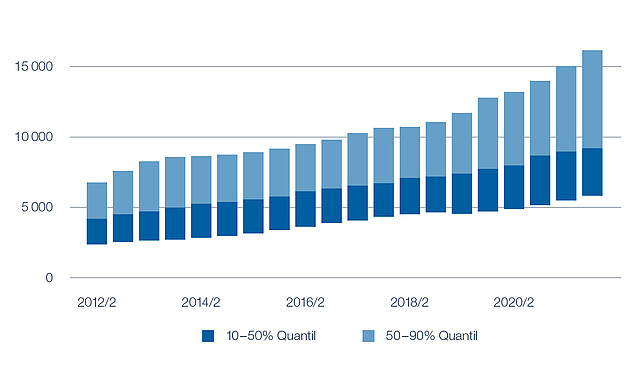Ever since the Brundtland Report at the latest it has been clear that we need to change the present if we want to have a sustainable future. While the Brundtland Report of 1987 provides a holistic description of "sustainable development", there are clear parallels to be drawn to developments in the real estate sector.
Sustainable development is defined as "development that meets the needs of the present without compromising the ability of future generations to meet their own needs".
In project development, it is vital to pay attention to the entire lifecycle of a property from the very first idea. As such, all decisions and activities must be aligned to our environmental and social responsibilities. This requires a careful analysis of the social and environmental effects of a project in order to precisely formulate all risks and opportunities. The risks, such as rising interest rates, higher yield requirements or an uncertain market environment must be compared to the long-term business opportunities.
Shareholders vs stakeholders
So how can sustainable development, environmental targets, economic claims, social aspects and a responsible corporate governance be integrated into the project development process, and what do we as the SFP Group identify as the biggest challenges?
The SFP Group has adopted sustainability targets that define its strategic focal points. To meet the needs of stakeholders and shareholders, these focal points provide the framework within which investment decisions are taken, properties are developed and the potential of the portfolio is evaluated. Identifying the stakeholders and involving them in the sustainability process not only minimise the risks, but also take account of their requirements and concerns. This enhances the acceptance and implementation of the sustainability measures, and finally ensures long-term success when it comes to environmental, social and economic sustainability. Open and transparent communication is key to understanding the different requirements and doubts and to meeting the targets of the developer and the expectations of the stakeholders. During the annual reporting process these targets are reviewed and analysed, and adjusted and expanded if necessary.
At the same time, the project development process must meet the demands for stable returns. Rising prices for building land, the high costs of raw materials, the tightening of interest rate policies for mortgages and expensive debt financing pose a great challenge when it comes to the integration of sustainability targets into the project development process. Although it is still more expensive to build a property that has been developed in line with sustainability standards than a conventional property, low maintenance costs, the added value created by market acceptance and absorption, and the growing reputation of the company make it possible to compensate for this difference in costs with the promise of generating stable returns.
Green development
Holistic project analysis and planning are needed if sustainability is to be integrated into the project development process. Location, mobility, building construction, heating and cooling systems and materials selection play a decisive role here. Long-term and sustainable development can be ensured by using renewable energies as well as sustainable and resource-conserving materials. Innovative technologies, building methods and materials can be used to minimise the environmental burden throughout the entire lifecycle of the building. Even simple measures such as replacing fossil heat generators by renewable energies in existing properties can already help to minimise the CO2 emissions and reduce the consumption of energy.
The project development team at the SFP Group is currently working closely with the SF Sustainable Property Fund's portfolio team on several sites. The main focus falls on close cooperation with all stakeholders and the responsible management of the existing portfolio. The topic of further development or continued building rather than new construction takes centre stage and embodies the sustainability targets of the SFP Group.
Value creation and social responsibility
In Switzerland, the "Buildings" sector is responsible for 24% of greenhouse gas emissions.1 Although these emissions have been reduced by 39% compared to 1990, the declared target of 40% has not yet been reached. Great commitment from the real estate sector is needed to pursue a long-term climate strategy and reach the net-zero target by 2050 (no greenhouse gas emissions). The aim of Sustainable Development Goal 11 of the United Nations is to make cities and human settlements inclusive, safe, resilient and sustainable.2
In the long run, however, focusing on the "easy targets" such as exchanging heat generators or using photovoltaic systems and improving thermal insulation will not be nearly enough to turn the reduction path towards "net zero". New solutions that are environmentally, economically and socially viable are needed to speed up decarbonisation.
Conclusion: The project development team itself is responsible for defining sustainable solutions, understanding social and economic requirements and generating value for our future generations.
Sources:
1 Climate: In brief, Federal Office for the Environment, 2022
2 SDG 11: Sustainable cities and communities: Make cities and human settlements inclusive, safe, resilient and sustainable


